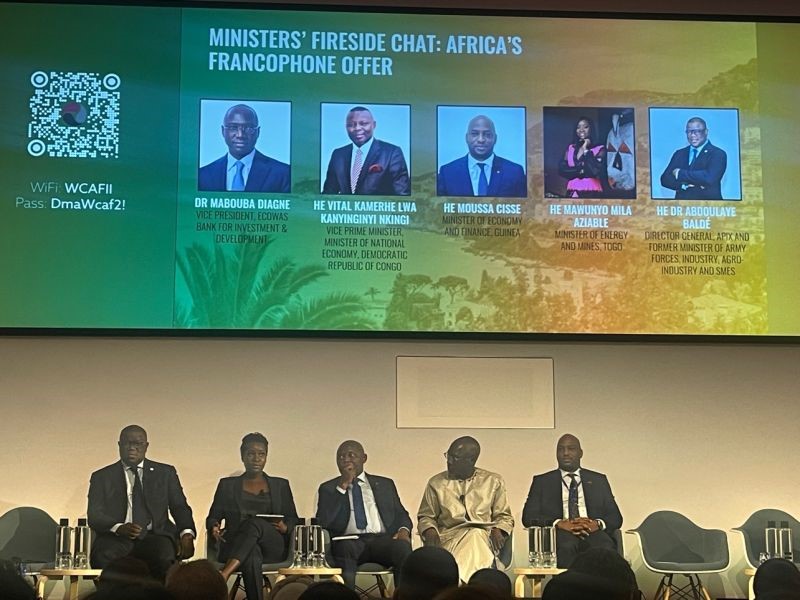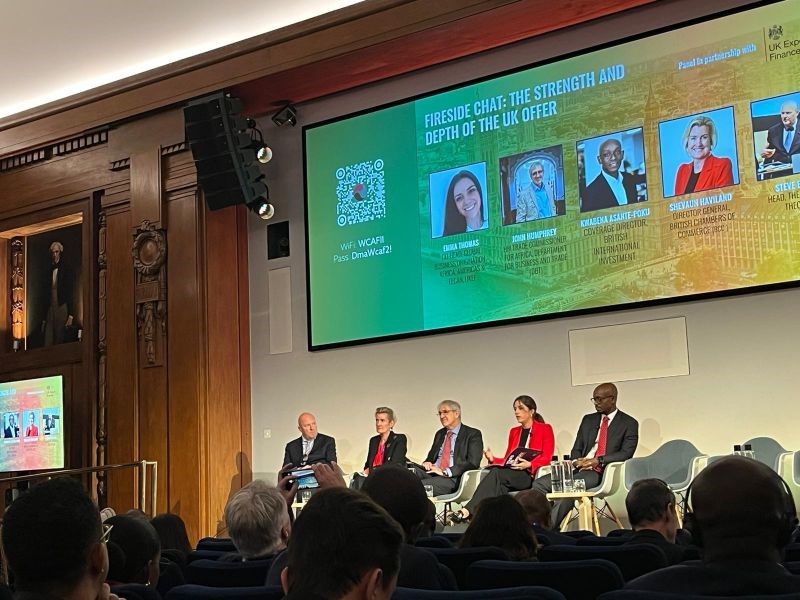On October 18, 2023, the second edition of the UK-Francophone West and Central Africa Trade and Investment Forum was held at the IET Savoy in London. The event was organised by UK Export Finance (UKEF), the UK’s export credit agency, and DMA Invest, and it brought together prominent representatives from Benin, Cameroon, Côte d’Ivoire, the Democratic Republic of Congo, Guinea, Senegal, and Togo to discuss new trade and investment opportunities with their UK counterparts.
The event included a variety of discussions that focused on the UK’s offer to Francophone West and Central Africa, its strength and depth, women and youth development, de-risking and mobilising private capital to drive growth, and various opportunities across sectors and countries. The event’s purpose was clear: the United Kingdom was making a huge pitch to Francophone West and Central Africa, and the region was open for business.
Speaking ahead of the event, the UK’s International Trade Minister, Nigel Huddleston, intimated that “West and Central Africa is a huge investment opportunity for the UK”. He added that “the Francophone markets have a clear vision for delivering economic growth and prosperity, and the UK is ready to support those countries by building long-term, modern partnerships that are mutually beneficial.”

Many people might raise an eyebrow at a trade relationship between the United Kingdom and Francophone West and Central Africa. However, in light of current world developments, the timing of these discussions makes more sense. On the one hand, the desire from Francophone African countries to seek additional economic and political allies outside of France has grown in recent years. The French continue to be the de facto partner for the majority of Francophone countries, but there appears to be a greater demand for other partners these days. In contrast, post-Brexit Britain is looking to create new relationships to drive economic growth. In contrast, post-Brexit Britain is looking to create new relationships to drive economic growth. The UK has also set an ambitious objective of £1 trillion in exports by the end of the decade, which will necessitate finding new markets to sell goods and services in.
A deeper examination of trading and investment flows reveals a potentially win-win situation. For example, of the £5 billion invested in Africa by UK Export Finance in the last five years, £700 million has gone to Francophone West and Central Africa. Various Francophone African countries have also achieved tariff-free and quota-free market access for crops such as bananas and sweetcorn, offering an effective route-to-market for African agricultural exports in the UK.
At the same time, economic growth in the eight-member West African Economic and Monetary Union is projected to rise to 7% this year as many of the countries recover from the shock of the Russia-Ukraine crisis. When you consider the United Kingdom’s experience in other regions of Africa, as well as the continent’s much-reported increasing middle class, establishing a trading connection that covers the continent makes a lot of sense.

It is also worth noting that there has been a big push (driven by African countries) to transition the continent towards greater industrialisation. The African continent as a whole has developed a reputation as a destination for raw materials that are typically traded with other countries for various stages of refinement and value addition. In many cases, these refined raw materials are then sold back to the continent. However, this narrative is beginning to change, with increasing investment in local processing and refinement facilities on the continent. There has also been significant growth in the continent’s financial services and creative industries, offering significant trading and investment opportunities.
The necessity for successful collaboration, rather than the old “we will build it for you” approach that hasn’t served Africa’s interests well over the years, was a frequent topic throughout the keynotes and fireside chats. Several delegates consistently stated that only a collaborative effort will result in a win-win outcome for all stakeholders.
Another recurring topic was the necessity for reliable partners on the ground to support project delivery. According to the conversations during the event, there was definitely a desire for UK companies to investigate the Francophone West and Central Africa region, and the region was also open. However, because this is a new relationship, some resources will need to be committed in creating the essential trust and confidence on both sides before everyone can transact efficiently.
If the meetings in the foyer are any indication, it is safe to believe that the event is already producing results. It should be noted, however, that this is not the first conversation regarding opportunities in Africa. Many of these occurrences have occurred over time. What is frequently lacking is the essential work and commitment to turn these opportunities into jobs and other tangible realities. As previously stated, for this cooperation to thrive, it must be mutually beneficial, based on respect, and take into account what the respective countries want and need.
